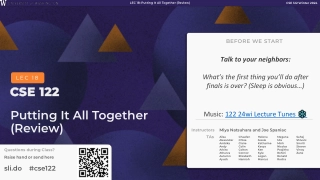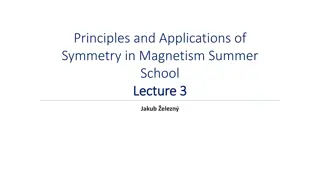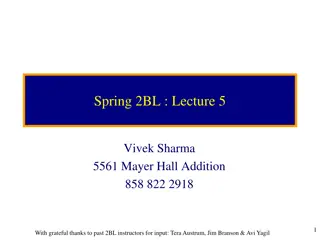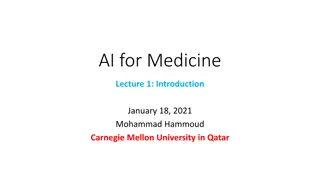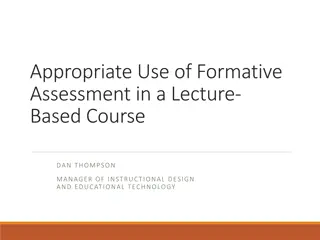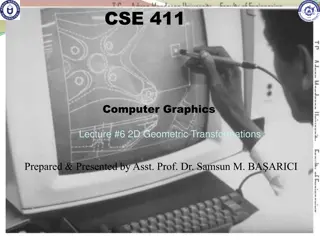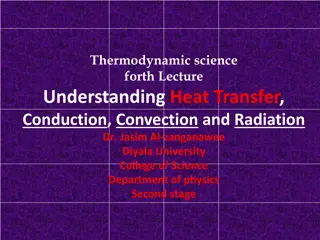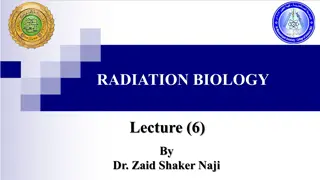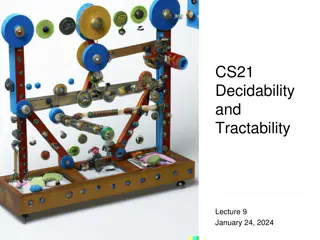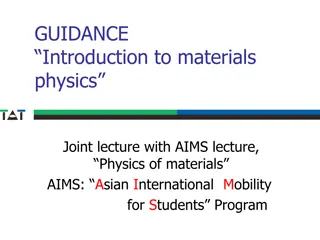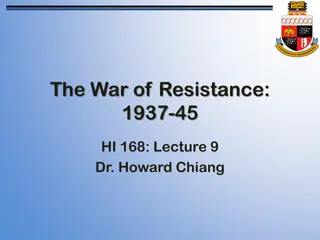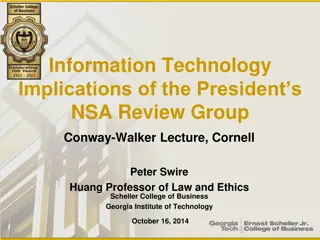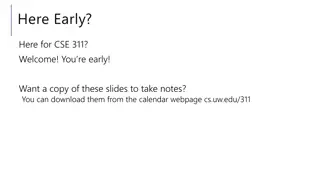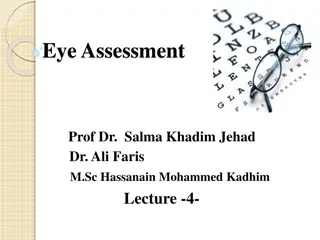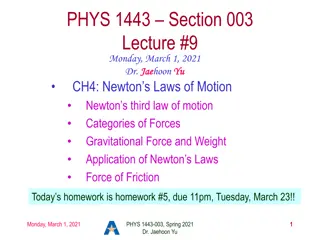
Slave Boy Experiment Analysis & Socrates' Method
Explore the thought-provoking Slave Boy Experiment from Plato's dialogue, "Meno," where Socrates guides the slave boy towards recollection through questioning, illustrating the value of aporia and true beliefs. Dive into the philosophical discourse challenging traditional methods of teaching and learning.
Download Presentation

Please find below an Image/Link to download the presentation.
The content on the website is provided AS IS for your information and personal use only. It may not be sold, licensed, or shared on other websites without obtaining consent from the author. If you encounter any issues during the download, it is possible that the publisher has removed the file from their server.
You are allowed to download the files provided on this website for personal or commercial use, subject to the condition that they are used lawfully. All files are the property of their respective owners.
The content on the website is provided AS IS for your information and personal use only. It may not be sold, licensed, or shared on other websites without obtaining consent from the author.
E N D
Presentation Transcript
Meno The slave boy experiment Analysis of the slave boy experiment Opinion and knowledge
The slave boy experiment 2 feet 2 feet
The slave boy experiment 4 feet 4 feet
The slave boy experiment 3 feet 3 feet
The slaves aporia Slave Slave: By Zeus, Socrates, I just don t know. Socrates Socrates: Meno, can you see where our friend here has got to on his journey towards recollection? At first, he didn t know would produce the figure with an area of 8 square feet just as he doesn t yet know the answer now either; but he still thought he knew thought he knew the answer then, and he was answering confidently, as if he had knowledge. He didn t think he was stuck before, but now he appreciates that he is stuck and he also doesn t think he knows what in fact he doesn t know. (84a-b) didn t know which line
Socrates defends his method (the benefit of aporia) Socrates Socrates: So he is better off with regard to what he didn t know? Meno Meno: Again, yes I think so. Socrates Socrates: So have we done him any harm by making him stuck and by our torpedo-like numbing of him. Meno Meno: No, I don t think we have. Socrates Socrates: At any rate, it seems that we ve increased his chances of finding out the increased his chances of finding out the truth truth of the matter, because now, given his lack of knowledge, he ll be glad to undertake the investigation (84b)
Socrates challenge Socrates Socrates: All I ll be doing is asking him questions, not teaching him anything, but you should make sure that you don t catch me teaching and explaining things to him, rather than just asking him for his thoughts. (84c-d)
True beliefs Socrates Socrates: So someone who doesn t know about whatever it is that he doesn t know has true beliefs beliefs inside him about these things that he doesn t know. (85c) true Socrates Socrates: At the moment, these beliefs have only just been stirred up in him and it all feels like a dream, but if he were to be repeatedly asked the same questions in a number of different ways, he d certainly end up with knowledge knowledge of these matters that is as good and as accurate as anyone s. (85c-d).
Socrates explains anamnesis Socrates Socrates: So if during both periods of time both when he is and when he isn t a human being there are true beliefs inside him which are awoken by questioning and become pieces of knowledge, doesn t it follow that his soul will have been in a state of knowledge for all time? After all, throughout the whole of time he clearly either is or is not a human being. (86a).
Its not Socrates theory Socrates Socrates: I wouldn t support every aspect of the argument with particular vigour (86b) But it s one he would fight for Socrates Socrates: but there s one proposition that I d defend to the death, if I could, by argument and by action: that as long as we think we should search for what we don t know we ll be better people (86b).
Is the experiment fair? Socrates knows the answer (he introduces the crucial concept of the diagonal) Cf. Phaedo : Learning is recollection (76a) Process only works if the questions are put in the right way (73a)
Anamnesis in the Phaedo Socrates Socrates: One very good argument, said Cebes, is that when people are asked questions, if the question is put in the right way they can give a perfectly correct answer, which they could not possibly do unless they had some knowledge and a proper grasp of the subject. And then if you confront people with a diagram or anything like that, the way in which they react is an unmistakeable proof that the theory is correct. (Phaedo 73a)
The acquisition of knowledge When did the slave boy acquire knowledge? During the experiment? Before? Why can t the soul learn now? Soul did not learn everything in disembodied states, it also learned in embodied states So why not this incarnation? (assuming that the soul has learned everything by 403bc is arbitrary)
The Scope of the Experiment A priori knowledge (knowledge that can be justified without appealing to the senses) E.g. 2 + 2 = 4 The Meno raises two kinds of questions: Epistemological question: how is knowledge justified? Psychological question: how is knowledge acquired? Can we extend a question about mathematics to virtue?
The psychological question If the slave is learning something (without being told the answers), we must ask: how does that learning take place? Socrates diagrams in the sand: probably not the perfect square, line etc. What s required beyond sense experience for the slave boy to understand the perfect square, line etc.? How do we form concepts?
The psychological question Sameness and difference we have the ability to connect things and differentiate them We can t have sensory experiences without concepts organising the sense data (cf. Kant) Socrates claims that, through aporia, he s got the slave boy to a state of true belief, not knowledge
Socrates hypothesises that excellence is knowledge Socrates Socrates: Since we don t know what it is or what sort of thing it is, let s look into the question of whether or not it s teachable by making the following assumption: what sort of mental quality would it have to be for it to be or not to be teachable? Above all, we should ask whether or not it s teachable (or recollectable, as we were saying just now, but let s not argue over which term to use) Socrates Socrates: So if excellence is a kind of knowledge, it evidently follows that it will be teachable. (87b-c)
True belief and knowledge Socrates Socrates: True belief, then, is just as good a guide as knowledge, when it comes to guaranteeing correctness of action (97b). Socrates Socrates: That s why knowledge is more valuable than true belief, and the difference between the two is that knowledge has been anchored. (98a)
Excellence is a gift from the gods Socrates Socrates: So, Meno, our argument has led us to suppose that the excellence of good people comes to them as a dispensation awarded by the gods. (100b)
Questions 1. Does the slave boy experiment succeed in proving the theory of anamnesis? 2. Based on your answer, which parts of the theory of anamnesis do you think Socrates agrees with? 3. How does the slave boy acquire knowledge during the experiment? 4. Is virtue correct opinion?

